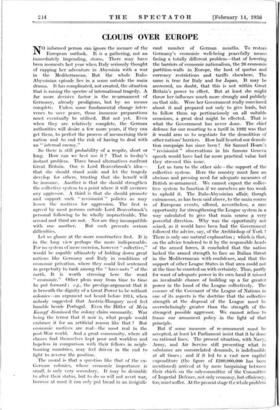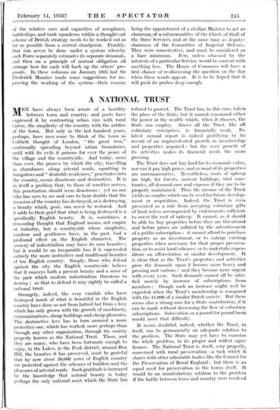CLOUDS OVER EUROPE
NO infortned• person can ignore the menace of the European' outlook. It is a gathering, not an immediately iMpending, storm. There may have been moments last year when Italy seriously thought of capping her 'adventure in Abyssinia with a war in the Mediterranean. But the whole Italo- Abyssinian episode lies in a sense outside the main drama. It has complicated, not created, the situation that is raising the spectre of international tragedy. A far more decisive factor is the re-armament of Germany, already prodigious, but by. no means complete. Unless some fundamental change inter- venes to save peace, those immense preparations must eventually be utilised. But not yet. Even when they are relatively complete, the German authorities will desire a few more years, if they can get them, to perfect the process of mesmerising their nation and to end the risk of having to deal with an " internal enemy." .
So there is still probability of a respite, short or long. How 'can we best use it ? That is to-day's instant problem. Three broad alternatives confront Great Britain. One is Lord Beaverbrook's idea— that she should stand aside and let the tragedy develop for others, trusting that she herself will be immune. Another is that she should strengthen the collective system to a point where it will overawe any aggressor. A third is that she should promote and support such " revisionist " policies as may lessen the 'tives for aggression. The first is m agreed by most persons outside Lord Beaverbrook's personal following to be wholly impracticable.. The second and third are not. Nor are they incompatible with one another. But each presents serious difficulties.
Let us glance at the more constructive first. It is in the long view perhaps the more indispensable. For no system of mere coercion, however " collective," would be capable ultimately of holding down great nations like Germany and Italy in conditions of economic privation, where they could feel sentenced in perpetuity to rank among the " have-nots " of the earth. It is worth stressing here the word " economic." Other pleas may from time to time be put forward ; e.g., the prestige-argument that it is beneath the dignity of a Great PoWer to be without colonies—an argument not heard before 1914, when nobody suggested that Austria-Hungary. need feel humble beside Portugal. Even the Hitler of Mein Kampf dismissed the colony claim summarily. War being the terror that it now is, what people would embrace it for an artificial reason like that ? But economic motives are real—the most real in the post-War world. And a great community, where all classes find themselves kept poor and workless and hopeless in comparison with their fellows in neigh- bouring* countries, may feel driven in the end to light to reverse the position.
The moral is that a question like that of the ex- German colonies, whose economic importance is small, is only very secondary. It niai. be desirable to alter their status, but to do so will_ilatiavert War,: because at most it can only put bread in an insigUifi- cant number of German mouths. To restore Germany's economic well-being peacefully means facing a totally different problem—that of lowering the barriers of economic nationalism, the 26 economic partition-walls in Europe, the host of quotas and currency restrictions and tariffs elsewhere. The same is true foi Italy and for Japan: It may be answered, no doubt, that this is not within Great Britain's power to effect. But at least she might throw her influence much more strongly and publicly on that side. Were her Government really convinced about it and prepared not only to give leads, but to follow them up pertinaciously on all suitable occasions, a great deal might be effected. That is what the Government has never done. The chief defence for our resorting to a tariff in 1932 was that it would arm us to negotiate for the demolition of other nations' barriers. How half-hearted our demoli- tion campaign has since been ! Sir Samuel Hoare's " revisionist " observations in his famous Geneva speech would have had far more practical value had they stressed this issue.
Let us turn to the other side—the support of the collective system. Here the country must face an obvious and pressing need for adequate measures of British re-armament. We cannot expect the collec- tive system to function if we ourselves are too weak to uphold it. The Italo-Abyssinian affair, though extraneous, as has been said above, to the main. course of European events, offered, nevertheless, a rare opportunity for strengthening the League system in a way calculated to give that main course p,. very powerful direction. Why was the Opportunity not seized, as it would have been had the Government followed the advice, say, of the Archbishop of York ? There is only one natural explanation ; which is that, on the advice tendered to it by the responsible .heads of the armed forces, it concluded that .the nation lacked the armed strength to face an Italian threat in the Mediterranean with confidence, and that the support of other League States in that area could not at the time be counted on with certainty. Thus, partly for want of adequate power in its own hand it missed an invaluable chance of building up a far greater power in the hand of the League collectively. The essence of the Covenant of the League of Nations in one of its aspects- is the doctrine that the collective strength at the disposal of the League must be overwhelmingly greater than the strength of the strongest possible aggressor. We cannot refuse to frame our armament policy in the light of that principle.
But if some measure_ of re-armament must be accepted, at least let Parliament insist that it be done on rational lines. The present situation, with Navy, Army, and Air Service still presenting what in substance arc uncorrelated demands,. is indefensible at all times ; and if it led to a vast new capital expenditure (the figure. of £280,000,000 has been mentioned) arrived, at by mere barkaining betWeen their chiefs on the sub-committee of the Committee of Imperial Defence, not only economy, but efficiency, too, must suffer. At the present stage the whole problem of the relative uses and capacities of aeroplanes, battleships, and tank squadrons within a, thought-out scheme of British strategy needs to be worked out as far as, possible from a central, standpoint. Frankly, that can never be done under a system whereby each Force separately estimates its separate demands, and then on a principle of mutual obligation all arrange how far each will back ..up the others' pro- posals. .In these columns on January 10th last Sir Frederick Maurice made some suggestions for im- proving the working of the system—their essence being the appointment of a civilian Minister to act as chairmau,-of ar subicommittee of the Chiefs of Staff of the three 'ServiceS, and at the same time as deputy- chairman of the Committee of Imperial Defence:. They were conservative, and -must be considered as a bare minimum. Few, unless obsessed by the interests of a particular Service, would be content with anything less. The House of Commons will have a first chance of re-discussing the .question on the day when these words appear. It is to be hoped that it will push its probes deep enough.















































 Previous page
Previous page